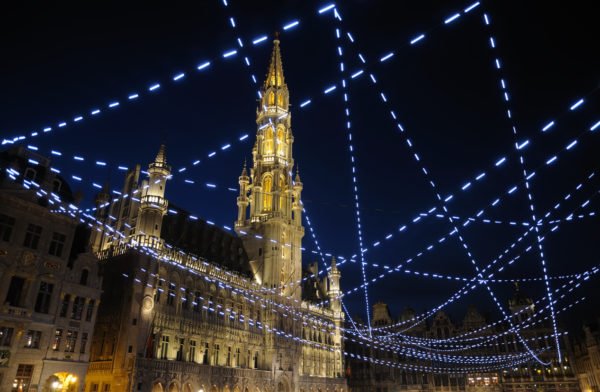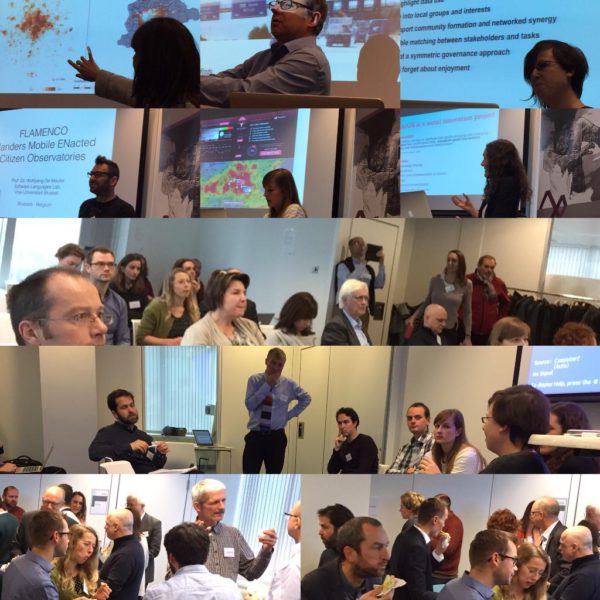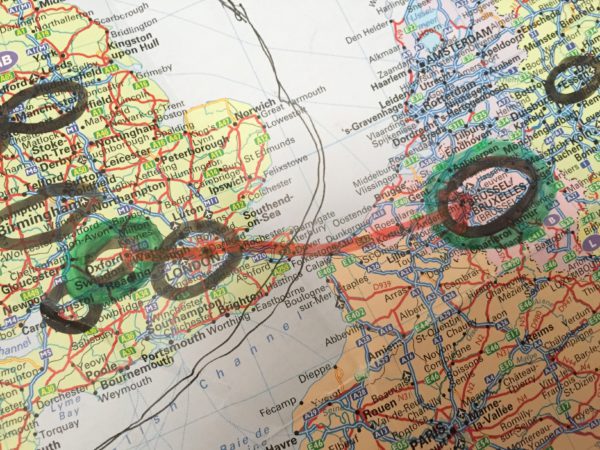European Smart Citizens as Decision Makers Rather than Data Providers
Professor Michael Keith and Dr Igor Calzada, MBA
 On 14 November 2016 the Urban Transformations programme, funded by the Economic and Social Research Council (ESRC), brought together a range of academics and practitioners from across Europe for a knowledge exchange event on smart cities. This workshop, which took place at the Centre for Studies, Media and Telecommunication (SMIT) at the Vrije Universiteit Brussel (VUB), was the first of a series entitled Bridging European Urban Transformations established in partnership with the VUB and its Brussels Centre for Urban Studies, with support from the RSA Smart City–Regional Governance for Sustainability Research Network. In this post-Brexit era, cooperation across borders and disciplines seems more important than ever before. Consequently the series, which runs from November 2016 to October 2017, emphasises the value of connections between institutions and key players in the field of urban transformations, in the UK and in the rest of Europe.
On 14 November 2016 the Urban Transformations programme, funded by the Economic and Social Research Council (ESRC), brought together a range of academics and practitioners from across Europe for a knowledge exchange event on smart cities. This workshop, which took place at the Centre for Studies, Media and Telecommunication (SMIT) at the Vrije Universiteit Brussel (VUB), was the first of a series entitled Bridging European Urban Transformations established in partnership with the VUB and its Brussels Centre for Urban Studies, with support from the RSA Smart City–Regional Governance for Sustainability Research Network. In this post-Brexit era, cooperation across borders and disciplines seems more important than ever before. Consequently the series, which runs from November 2016 to October 2017, emphasises the value of connections between institutions and key players in the field of urban transformations, in the UK and in the rest of Europe.
The workshop, (Un)Plugging Data in Smart City-Regions, focused on the necessity of unpacking and deconstructing the ‘smart cities’ paradigm that has been so influential in structuring the European policy agenda. The core idea that drove the discussions was the need to define the interconnections between ‘hard’ and smart’ infrastructures and the broader economic, political and social systems at the metropolitan and regional scales. The workshop was broken down into three themes: addressing new sources for data collection, storage and usage; urban expertise for citizen/user involvement; and finally, smart knowledge and expertise to tackle urban inequalities.
According to Gartner, 1.6 billion connected devices will be hooked up to the larger smart city infrastructure worldwide by the end of this year. However, as was highlighted in the discussions, some uncertainties remain at the centre of the debate around what Yuval Noah Harari has described as ‘dataism’. The workshop showcased how various projects within the ESRC Urban Transformations portfolio were exploring innovative strategies of data collection, storage and usage to harness urban and regional smart governance models to guide decision-making processes.
Richard Tuffs, the director of the European Regions Research and Innovation Network (ERRIN), a platform that connects academics and practitioners in a wide diverse of research fields within the European regions, introduced the workshop, emphasising the importance of citizen concerns regarding data policies and the role of institutions to foster ecosystems of experimentation via what are known as Triple/Quadruple/Penta Helix approaches, thinking through stakeholder interdependencies engaging not only the public sector, private sector and academia but also civic society, social entrepreneurs and activists.
In the first thematic discussion, addressing new sources of data collection, storage and usage, Peter Triantafillou, from the Urban Big Data Centre in Glasgow, presented the major obstacles to fostering a people-centred design of data that he called the ‘human in the loop’ – the acquisition, sharability and licensing restrictions of the obtained data. He advocated closer collaboration between computer scientists and social and political researchers in developing stronger evidence-based research on how tackle unexplored data issues so far. Paul Cowie, an Urban Transformations Research Fellow based at Newcastle University and Future Cities Catapult, elaborated on the need to consider individuals not only as citizens deliberating on their material conditions, but also as consumers agreeing and disagreeing to the particular terms of a service. In this respect, there he advocated a more human-centred approach to the smart city – one that fosters interplay and interdependencies among multiple stakeholders.

Citizen interaction, engagement, involvement, participation and deliberation are at the centre of the debates around smart cities and big data. How should we deal with the lack of trust, apathy and open outrage that has become increasingy evident in popular political attitudes today? The misalignments between technology and the social needs of citizens in data generation were identified as a common dilemma today: will data-driven devices continue to serve citizens or vice versa? As a consequence, different forms of engagemssent were discussed. However, as Morozov has argued, despite the plethora of technological solutions to social problems, key questions remained unanswered: ‘Who gets to implement data?’, for example, and ‘what kinds of politics of data do technological solutions smuggle through the back door?’. Discussions highlighted how the calls for data to be ‘open’, while apparently simple, in reality challenge existing legal norms and pose profound implications for users along the chain. For example, liability risks might be passed to the end user of open data – but what if end users cannot bear the risk? In the internet of things (IoT) generates continuous monitoring and commonly individualised data, how should we theorise, regulate and make visible the ethical choices that have now emerged around the legal liability surrounding the ownership of data?
The second thematic discussion showcased two participatory smart city projects: HackAIR and Flamenco (Flanders Mobile Enacted Citizen Observatories ). The first, HackAIR, is social innovation project and open technology platform for citizen observatories on air quality. The discussion focused on the levels of citizen engagement and related strategies such as crowdsourcing (citizens as sensors), distributed intelligence (citizens as basic interpreters), participatory science (citizens as participants in data collection) and extreme collaborative science (citizens as participants in problem definition and data analysis). The call to transit from the conception of citizens as data providers to citizens as decision makers provoked a powerful debate on the ethical dimensions of participatory innovative technologies. Flamenco developed this theme further, exploring how citizens can be empowered to tailor their own observatories based on participatory sensing and citizen science principles. An inter-disciplinary team presented a demonstration on the applicability of the project from computer science and social science perspectives.
In the final thematic strand of the workshop, the discussions focused on socio-economic developments and institutional capacity. The City of Things, presented by Pieter Ballon from SMIT-VUB, explored the experimental dimensions of data-driven living labs. In the presentation, these were related to multi-stakeholder co-creation processes for business, user design, prototyping and product development (aspects that will be explored at the next workshop on 13 February 2017 in Brussels). To conclude the workshop, Joana Barros from Birbeck, University of London, based within the Urban Transformations project RESOLUTION: REsilient Systems fOr Land Use TransportatION, highlighted the methodological difficulties involved in gathering and comparing data in two distinct metropolitan regions, London and São Paulo.
The workshop demonstrated that in one sense what was once novel has become received wisdom. It is now ‘common sense’ to suggest that the nature of the metropolis demands forms of knowledge that transcend old boundaries between humanities, natural sciences and social sciences. It has become almost self evident to assert that a model of knowledge production that is produced ‘upstream’ in the academy and then exported ‘downstream’ to city hall and local governance structures is inadequate for the metropolitan challenges of the 21st century. Instead we have moved towards a stronger sense of co-production between research and practice. The sense that the questions arise in the real world, but the answers are to be found in the academy, is less plausible than ever.
And yet. At worst, at times the ‘smart’ agenda, particularly in journalistic form and at times in spite of itself, can look like a return through the back door of a technocratic determinism whereby all urban ills are resolved through scientific solutions. Complexity can be analyically generative, simplicity narratively powerful. Such naïve arguments are in reality more often the belief of second rate technocrats and third rate academic critique.

More interestingly we see a situation where the complex and open systems of urban life are disrupted by rapid social change and powerful economic forces. Recognising that such change is unpredictable in its disruptive form and uneven in its social consequences, one function of academic research is to speculate, to test, to map and to trace how disruptive technologies restructure the relationship between the individual and the city. The smart citizen at the heart of the new city needs to uncerstand both the emancipatory potential and the divisive consequences of different moments of disruptive innovation. As Ballon suggested in the case of his living lab in Brussels, it is the duty and function of Urban Living Labs to surface and make visible the choices at stake rather than provide singular solutions to problems. How we make these choices then becomes a mediation of scientific expertise and deliberative democracy.
ESRC investments and collaborative links in Brussels at the workshop highlighted how data-driven issues presented new pathways to conduct research and implement policy. However, if we want to unplug data we must consider also deeper the underlying social and ethical questions and policy implications alongside those affecting the technical capacity to store and distribute bits of information and the power of data science. This workshop sparked a provocation as well as an effective knowledge exchange. Dystopian visions and technocratic utopias alike demand rigorous research scrutiny and public debate to optimise the chances of shaping a better future city.
Peter Triantiafillou presentation
Keith, M. & Calzada, I. (2016), European Smart Citizens as Decision Makers Rather Thank Data Providers, Urban Transformations ESRC report on 14th November 2016 Workshop entitled ‘(Un)Plugging Data in Smart City-Regions‘. DOI: 10.13140/RG.2.2.11175.14240/1.